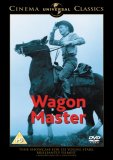 Wagonmaster | DVD | (05/05/2008)
from £13.82
| Saving you £-3.83 (N/A%)
| RRP
Wagonmaster | DVD | (05/05/2008)
from £13.82
| Saving you £-3.83 (N/A%)
| RRP Wagonmaster
![The Picture Of Dorian Gray [Blu-ray] [1945] [US Import] [Region Free]](/pictures/1152510.jpg) The Picture Of Dorian Gray | Blu Ray | (18/11/2014)
from £N/A
| Saving you £N/A (N/A%)
| RRP
The Picture Of Dorian Gray | Blu Ray | (18/11/2014)
from £N/A
| Saving you £N/A (N/A%)
| RRP 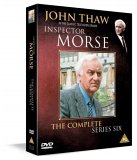 Inspector Morse - Series 6 | DVD | (21/02/2005)
from £25.63
| Saving you £-0.64 (N/A%)
| RRP
Inspector Morse - Series 6 | DVD | (21/02/2005)
from £25.63
| Saving you £-0.64 (N/A%)
| RRP This box set features the entire sixth series of the classic British Television drama Inspector Morse. Episodes comprise: 1. Dead On Time: Morse becomes deeply involved when a Don apparently commits suicide. The man's wife Susan was once engaged to Morse who makes no secret of the fact that he is still in love with her... 2. Happy Families: A wealthy industrialist is murdered yet his family seem uninterested until a second murder occurs... 3. The Death
![Three Faces West & Shepherd of the Hills (John Wayne) [1940]](/pictures/1041627.jpg) Three Faces West & Shepherd of the Hills (John Wayne) | DVD | (26/06/2006)
from £14.86
| Saving you £-4.87 (N/A%)
| RRP
Three Faces West & Shepherd of the Hills (John Wayne) | DVD | (26/06/2006)
from £14.86
| Saving you £-4.87 (N/A%)
| RRP Three Faces Of The West (Dir. Bernard Vorhaus 1940): A refugee physician and his daughter find themselves part of a group of townspeople who are trying to relocate out of the dust bowl region of the South Central U.S. John Wayne stars the group's tireless leader. Shepherd Of The Hills (Dir. Henry Hathaway 1941): When a stranger comes to an isolated mountain village and tempers the rough rage of its inhabitants one of the mountaineers (""The Duke"") is still suspicious of this mysterious interloper--and not incidentally still bitter over being deserted by his father as an infant.
 Maureen O'Hara - Screen Goddess | DVD | (28/08/2006)
from £N/A
| Saving you £N/A (N/A%)
| RRP
Maureen O'Hara - Screen Goddess | DVD | (28/08/2006)
from £N/A
| Saving you £N/A (N/A%)
| RRP The Quiet Man (Dir. John Ford 1952): John Ford's The Quiet Man celebrates one of Hollywood's most romantic and enduring epics. The first American feature to be filmed in Ireland's picturesque countryside Ford richly imbued this masterpiece with his love of Ireland and its people. Sean Thornton is an American who swears off boxing after accidentally killing an opponent. Returning to the Irish town of his birth he finds happiness when he falls in love with the fiery Mary Kate. Though he is sorely tempted to pick up the gloves against her brother the town bully Sean is determined not to use his fists. Mary Kate and Sean wed but her brother refuses to pay the dowry. Sean would rather walk away than accept this challenge. Even when his new wife accuses him of cowardice Sean stands firm. But when she boards a train to leave he is finally ready to take matters into his own hands. Rio Grande (Dir. John Ford 1950): John Wayne and Maureen O'Hara are embroiled in an epic battle with the Apaches and each other in this John Ford classic. Lt Col. Yorke (Wayne) heads to the Rio Grande to fight a warring tribe. But Yorke faces his toughest battle when his unorthodox plan to outwit the elusive Apaches leads to possible court-martial. Locked in a bloody war he must fight to redeem his honour and save his family. Against All Flags (Dir. George Sherman 1952): In 1700 the pirates of Madagascar menace the India trade; British officer Brian Hawke has himself cashiered flogged and set adrift to infiltrate the pirate ""republic."" There Hawke meets lovely Spitfire Stevens a pirate captain in her own right and the sparks begin to fly; but wooing a pirate poses unique problems. Especially after he rescues adoring young Princess Patma from a captured ship. Meanwhile Hawke's secret mission proceeds to an action-packed climax. Rare Breed (Dir. Andrew V. McLaglen 1966): In the 1880s Englishwoman Martha Price (Maureen O'Hara) and her daughter Hilary (Juliet Mills) come to America to sell their prize Hereford bull at an auction. When he is purchased by Bowen a wild Scotsman (Brian Keith) the women hire a footloose cowhand named Burnett (James Stewart) to help them transport the animal to its new owner. So begins an adventure that tests the mettle of all involved as they battle killers cattle stampedes and each other. But when they reach Bowen's ranch even greater obstacles force them to summon up extraordinary courage if they and the prize bull are to survive... Our Man In Havana (Dir. Carol Reed 1959): Jim Wormold (Alec Guinness) a vacuum cleaner salesman in Havana is recruited by the British Intelligence Services. As he has nothing to report he invents facts and pretends to discover secret operations...with disastrous consequences. Carol Reed directs this adaptation of the Graham Greene story. Lady Godiva Of Coventry (Dir Arthur Lubin 1955): Fictionalized account of events leading up the famous nude ride (alas her hair covers everything) of the militant Saxon lady
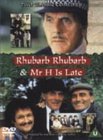 Rhubarb Rhubarb / Mr H Is Late | DVD | (09/09/2002)
from £14.99
| Saving you £-2.00 (N/A%)
| RRP
Rhubarb Rhubarb / Mr H Is Late | DVD | (09/09/2002)
from £14.99
| Saving you £-2.00 (N/A%)
| RRP Two hilarious short films from British funny man Erik Sykes: 'Rhubarb Rhubarb' concerns a mad game of golf and in 'Mr H Is Late' a coffin is late for a funeral...
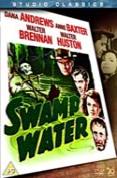 Swamp Water | DVD | (17/04/2006)
from £11.49
| Saving you £1.50 (13.05%)
| RRP
Swamp Water | DVD | (17/04/2006)
from £11.49
| Saving you £1.50 (13.05%)
| RRP When hunter Ben (Andrews) happens upon a fugitive (Brennan) and his daughter (Baxter) living in a Georgia swamp he falls in love with the girl. However for them to be together he must first somehow pursuade the fugitive to return to town... A little seen wartime gem from French maestro Jean Renoir.
![Roger and Me [1989]](/pictures/1014713.jpg) Roger and Me | DVD | (15/03/2004)
from £19.95
| Saving you £-5.96 (N/A%)
| RRP
Roger and Me | DVD | (15/03/2004)
from £19.95
| Saving you £-5.96 (N/A%)
| RRP Made in 1989, Roger and Me is a loose, smart-alecky documentary directed and narrated by Michael Moore. Here for the first time, the man who won unexpected Oscar glory with Bowling for Columbine exposed audiences to his devastating wit and a working-class pose. When his hometown is devastated by the plant closure of an American corporate giant (making record profits, one should note), the hell-raising political commentator with a prankster streak tries to turn his camera on General Motors Chairman Roger B Smith, the elusive Roger of the title, and the film is loosely structured around Moore's odyssey to track down the bigwig for an interview. While Moore ambushes his corporate subjects like a blue-collar Geraldo Rivera, a guerrilla interviewer who treasures his comic rebuffs as much as his interviews, his portraits of the colourful characters he meets along the way can be patronising. The famous come off as absurdly out of touch (Anita Bryant appears for some can-do cheerleading, and hometown celebrity Bob Eubanks tells some boorish jokes), and the disenfranchised poor (notably an unemployed woman who sells rabbit meat to make ends meet) all too often appear as buffoons or hicks. But behind his loose play with the facts and snarky attitude is a devastating look at the victims of downsizing in the midst of the 1980s economic boom. This portrait of Reagan's America and the tarnish on the American dream comes down to a simple question: what is corporate America's responsibility to the country's citizens? That's a question no-one at GM wants to answer. --Sean Axmaker
![The Quiet Man [1952]](/pictures/1013191.jpg) The Quiet Man | DVD | (15/01/2001)
from £20.00
| Saving you £-10.01 (N/A%)
| RRP
The Quiet Man | DVD | (15/01/2001)
from £20.00
| Saving you £-10.01 (N/A%)
| RRP Blarney and bliss, mixed in equal proportions. John Wayne plays an American boxer who returns to the Emerald Isle, his native land. What he finds there is a fiery prospective spouse (Maureen O'Hara) and a country greener than any Ireland seen before or since--it's no surprise The Quiet Man won an Oscar for cinematography. It also won an Oscar for John Ford's direction, his fourth such award. The film was a deeply personal project for Ford (whose birth name was Sean Aloysius O'Fearna), and he lavished all of his affection for the Irish landscape and Irish people on this film. He also stages perhaps the greatest donnybrook in the history of movies, an epic fistfight between Wayne and the truculent Victor McLaglen--that's Ford's brother, Francis, as the elderly man on his deathbed who miraculously revives when he hears word of the dustup. Barry Fitzgerald, the original Irish elf, gets the movie's biggest laugh when he walks into the newlyweds' bedroom the morning after their wedding, and spots a broken bed. The look on his face says everything. The Quiet Man isn't the real Ireland, but as a delicious never-never land of Ford's imagination, it will do very nicely. --Robert Horton
 Michael Caine Box Set: Alfie/The Italian Job/Zulu | DVD | (07/06/2004)
from £N/A
| Saving you £N/A (N/A%)
| RRP
Michael Caine Box Set: Alfie/The Italian Job/Zulu | DVD | (07/06/2004)
from £N/A
| Saving you £N/A (N/A%)
| RRP Zulu The year: 1879. The place: Natal Africa. One British garrison has already fallen to a huge army of Zulu tribesmen. The fearless native warriors are now heading for the isolated colonial outpost of Rorke's Drift which is manned by no more than a hundred South Wales Borderers. Alfie Alfie is a good-looking charmer who finds that the Swinging Sixties are a great time to be around in. He's always able to sweet-talk women into bed and he just doesn't care about t
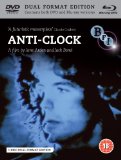 Anti-Clock (DVD + Blu-ray) | Blu Ray | (13/08/2012)
from £20.79
| Saving you £2.20 (10.58%)
| RRP
Anti-Clock (DVD + Blu-ray) | Blu Ray | (13/08/2012)
from £20.79
| Saving you £2.20 (10.58%)
| RRP Anti-Clock, Jane Arden and Jack Bond's last collaborative work, mixes pioneering video techniques with pin-sharp colour footage in order to create a densely woven, dream-like narrative which explores issues of personal identity and social conformity. Based on Jane Arden's extraordinary writings on the limitations of rational thought, this groundbreaking films has remained unseen since its last public screening in 1983 and is presented here in a new transfer from the original 16mm negative, along with a selection of never-before-seen special features.
![Rogues Yarn/The Steel Key [DVD]](/pictures/1137245.jpg) Rogues Yarn/The Steel Key | DVD | (05/10/2015)
from £N/A
| Saving you £N/A (N/A%)
| RRP
Rogues Yarn/The Steel Key | DVD | (05/10/2015)
from £N/A
| Saving you £N/A (N/A%)
| RRP ROGUES YARN: When Derek Bond is persuaded by his mistress, Nicole Maurey, to murder his rich invalid wife, he concocts a seemingly waterproof alibi by appearing to be in charge of his yacht on a Channel crossing at the time of her demise. But the scheme proves full of holes under the close inspection of Elwyn Brook-Jones’s Scotland Yard inspector. Co-written and directed by Vernon Sewell, a keen sailor in his spare time, can also be seen acting in this film. It was partly shot on location at Shoreham and Le Havre. SCARLET WEB: Directed By Robert Baker, who went on to direct “The Saint”. Steel Key tells the story of An adventurer who embarks on a mission to track down a group of thieves who have stolen the formula for processed hardened steel, and are going to extreme and violent lengths to cover their tracks. Thriller, starring Terence Morgan, Joan Rice and Raymond Lovell.
![Naked as Nature Intended / Secrets of a Windmill Girl [DVD]](/pictures/1107980.jpg) Naked as Nature Intended / Secrets of a Windmill Girl | DVD | (18/04/2011)
from £N/A
| Saving you £N/A (N/A%)
| RRP
Naked as Nature Intended / Secrets of a Windmill Girl | DVD | (18/04/2011)
from £N/A
| Saving you £N/A (N/A%)
| RRP Titles Comprise: Naked as Nature Intended: The George Harrison Marks' nudie classic that was previously thought lost! City girls Pamela and Jacki hire a car to explore some of Britain's most beautiful countryside in Devon and Cornwall. Already enjoying some freedom from the routine of daily life they stumble upon committed nudists Bridget and Angela - and that's when the holiday and the fun really starts. Secrets of a Windmill Girl: London's historic Windmill Theater became famous as the only London establishment that stayed open throughout the Blitz. At the time it offered live entertainment that mixed comedy with semi-nude burlesque dancing. Filmed by Stanley Long Secrets of a Windmill Girl captures the excitement of London in the mid-60s while telling the tale of the brutal demise of Windmill's star performer. All of the stage scenes use the theatre's real dancers to give viewers a taste of what the Windmill was like back in the 60s.
![The Quiet Woman [DVD]](/pictures/1131462.jpg) The Quiet Woman | DVD | (10/02/2014)
from £13.99
| Saving you £-1.00 (N/A%)
| RRP
The Quiet Woman | DVD | (10/02/2014)
from £13.99
| Saving you £-1.00 (N/A%)
| RRP 1951 crime drama from renowned Hammer director John Gilling with acclaimed cinematography sees Jane Hylton confronted by her past. Jane Foster, the former wife of a criminal, moves to a coastal town and takes over the running of a bar known as 'The Quiet Woman'. Initially she's outraged when she learns that the previous owner had allowed an amiable local artist, and part-time smuggler, Duncan McLeod (Derek Bond) to use the inn as a base. In spite of her resentment she becomes romantically i...
 George And Mildred - Series 1 | DVD | (04/06/2001)
from £N/A
| Saving you £N/A (N/A%)
| RRP
George And Mildred - Series 1 | DVD | (04/06/2001)
from £N/A
| Saving you £N/A (N/A%)
| RRP George and Mildred was a spin-off from Johnny Mortimer and Brian Cookes successful 1970s sitcom Man About the House, and ran from 1976 to 1980. This release features the first six episodes. Starring the late, great Yootha Joyce as Mildred Roper, a sex-starved cockney housewife with pretensions to the middle classes, and Brian Murphy as George, her hopeless and incorrigible husband, this series sees them make the upward move to posh Middlesex suburbia, despite George being on supplementary benefit--mortgage conditions were evidently easier in 70s sitcomland. Their neighbours are snooty estate agent Jeffrey Fourmile, his wife Ann and son Tristram. Jeffrey is perturbed that the Ropers arrival will lower the tone of the neighbourhood ("Tristram will get nits!") as they stink up the street with their three-wheel car and cheap wartime furniture. Much mildly amusing comedy at the expense of the working/middle class divide ensues, with no double-entendre left unturned and some period gags to match the Ropers interior decor. Situations involving a local MP, Mildreds even snobbier sister and an unsightly caravan brought out the best in Joyce and Murphys excellent characters, while Nicholas Owen as Tristram was among the least annoying of child sitcom stars. --David Stubbs
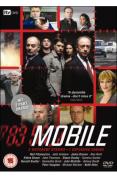 Mobile | DVD | (09/04/2007)
from £N/A
| Saving you £N/A (N/A%)
| RRP
Mobile | DVD | (09/04/2007)
from £N/A
| Saving you £N/A (N/A%)
| RRP Mobile is a new conspiracy thriller which unfolds against the backdrop of the Iraq war and the corrupt world of the multi-billion pound mobile phone industry flashing back and forth to retrace events from the perspectives of three different people: the engineer the soldier and the boss. Each episode features the same story told from a different viewpoint and only in the final scenes of the third episode is the connection between all three stories made for the first time in a shocking conclusion! A young man is shot at point blank range for using is mobile phone while driving whilst a Corsoncom mobile phone mast in Wigan is blown-up. Then when a gunman shoots a passenger using a phone and the driver of an inter-city train police make a connection between the three events and name Edie (Neil Fitzmaurice) as their number one suspect
![Emma [1996]](/pictures/1017720.jpg) Emma | DVD | (27/09/2004)
from £6.34
| Saving you £6.65 (104.89%)
| RRP
Emma | DVD | (27/09/2004)
from £6.34
| Saving you £6.65 (104.89%)
| RRP An adaptation of Jane Austen's story of marriage and manners set in a picturesque 19th Century village which revolves around a spoilt young woman Emma Woodhouse who delights in influencing the love-lives of her friends with disastrous results.
 George And Mildred - Series 2 | DVD | (30/01/2006)
from £13.77
| Saving you £-0.78 (N/A%)
| RRP
George And Mildred - Series 2 | DVD | (30/01/2006)
from £13.77
| Saving you £-0.78 (N/A%)
| RRP George and Mildred are the ultimate odd couple the popular landlord and landlady from Man About The House who became a household name with Thames Television in the 1970's and 80's. Mildred is vain snobbish and domineering; George is shy timid frigid and henpecked. Together they make a great partnership! Episodes comprise: 1. Jumle Pie 2. All Around The Clock 3. The Travelling Man 4. The Unkindest Cut Of All 5. The Right Way To Travel 6. The Dorothy Letters 7.
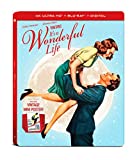 It's a Wonderful Life 4K UHD Steelbook (4K UHD + Blu-ray + Digital) | Blu Ray | (17/11/2020)
from £N/A
| Saving you £N/A (N/A%)
| RRP
It's a Wonderful Life 4K UHD Steelbook (4K UHD + Blu-ray + Digital) | Blu Ray | (17/11/2020)
from £N/A
| Saving you £N/A (N/A%)
| RRP ![Press For Time [1966]](/pictures/1012975.jpg) Press For Time | DVD | (12/11/2001)
from £7.52
| Saving you £2.47 (32.85%)
| RRP
Press For Time | DVD | (12/11/2001)
from £7.52
| Saving you £2.47 (32.85%)
| RRP In Press for Time Norman Wisdom offered his version of the crusading reporter movie, though by 1966 time was running out for Norman's style of big-screen comedy. Wisdom had played duel roles in The Square Peg (1958) and On the Beat (1962), but perhaps a sign of his growing frustration with the formulaic nature of his pictures was that he stretched himself to play not just his usual underdog hero, but also his own mother and his grandfather, the Prime Minister. Wisdom also co-wrote the movie, and as a reporter in a small seaside town causes chaos for the council, organises a beauty parade and manages to reprise his drag act (he dressed as a female nurse in A Stitch in Time) as a suffragette. This was really the penultimate Norman Wisdom comedy, since apart from What's Good for the Goose (1969), he has only made two more features, William Friedkin's The Night They Raided Minsky's (1968) and the belated thriller Double X (1992). Though now nearing the end of his years as a movie star, Wisdom shows himself to still be as polished as ever at his own brand of good-natured slapstick. Fans can be sure that with Norman around there's Trouble in Store (1953). --Gary S. Dalkin

Please wait. Loading...
This site uses cookies.
More details in our privacy policy